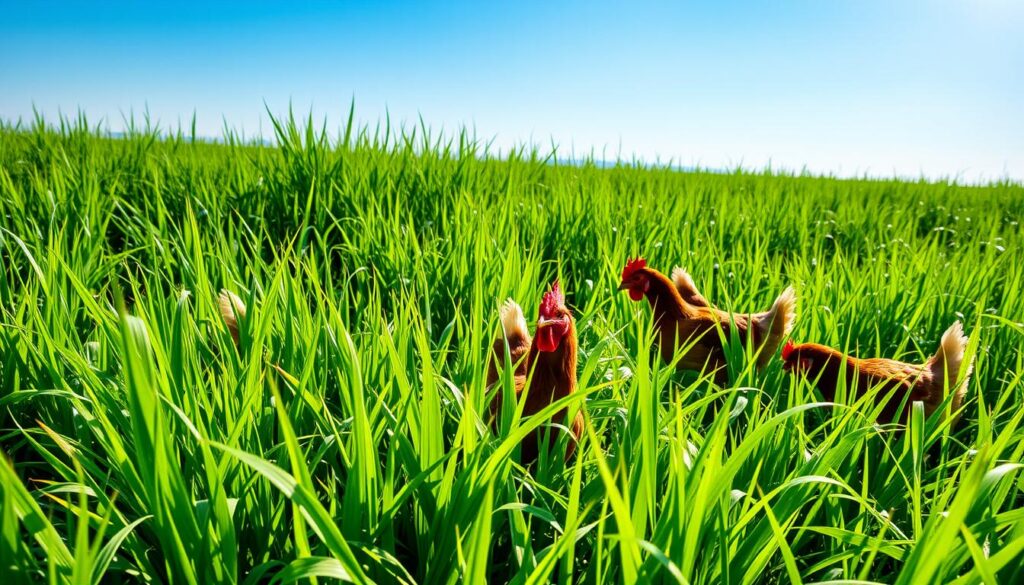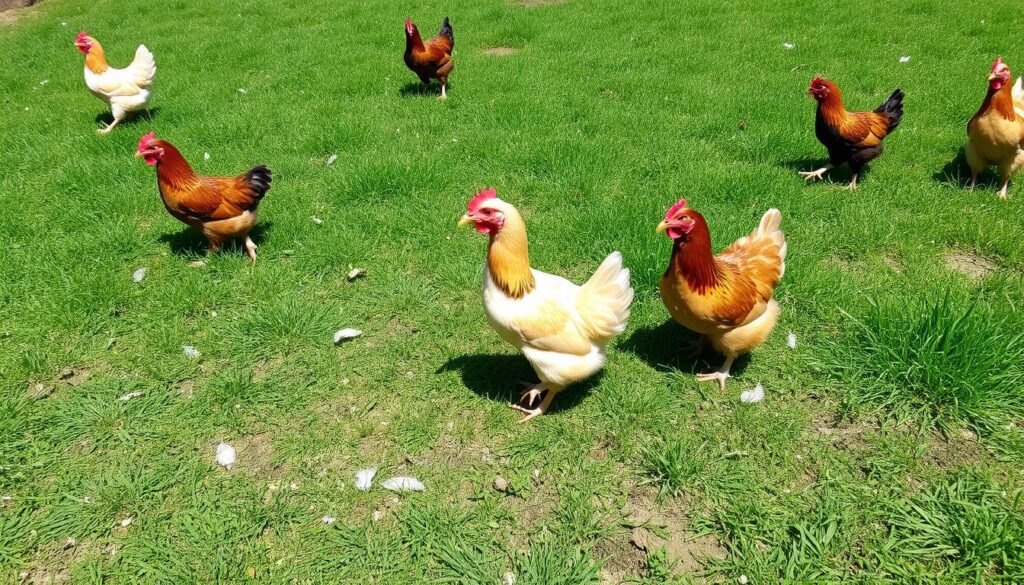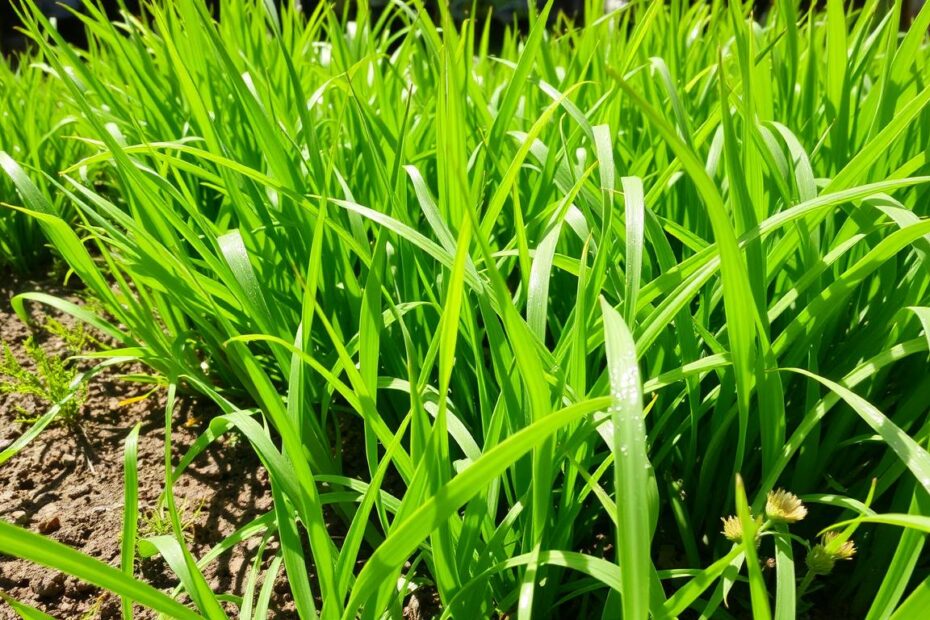Keeping a green lawn with backyard chickens can be tough. But, I’ve found ways to make it work. With the right grass and strategies, you can have a beautiful lawn and happy chickens.
In this article, I’ll share my best tips for fast-growing grasses. I’ll also talk about how to protect your lawn from chickens. Whether you’re new to chicken keeping or have experience, this guide will help. You’ll learn how to create a beautiful backyard for your chickens and a lush lawn.
Key Takeaways
- Discover the best fast-growing grass varieties for a chicken-filled backyard
- Learn strategies to minimize the impact of chickens on your lawn
- Establish a healthy chicken forage area that complements your lush grass
- Maintain a thriving lawn despite the presence of a backyard chicken flock
- Optimize your backyard design for a harmonious coexistence of grass and chickens
Introduction to Growing Grass With Chickens
Raising chickens can be very rewarding. But, their pecking and scratching can harm your lawn. It’s possible to grow a healthy, chicken-friendly grass with the right steps.
Challenges of Maintaining a Lawn with Chickens
Chickens can be hard on grass because of their natural habits. Their scratching and foraging can damage the grass. Their waste can also lead to bare spots. Plus, the area around the coop and run can get compacted, making it hard for grass to grow.
Tips for Growing Grass in a Chicken-Filled Yard
- Choose a durable, resilient grass variety that can withstand the wear and tear of chicken activity.
- Establish a regular mowing and maintenance routine to encourage grass growth and prevent it from becoming overgrazed.
- Provide ample space for your chickens to roam and forage, rotating their access to different areas of the yard to allow the grass to recover.
- Incorporate organic matter, such as compost or well-rotted chicken manure, into the soil to improve fertility and drainage.
- Consider building a raised garden bed or designated chicken run to protect certain areas of your lawn from excessive damage.
By understanding the challenges and using the right strategies, you can grow a thriving, chicken-friendly lawn. This lawn will benefit both your chickens and your landscape.
Strategies to Minimize Chickens’ Impact on Grass
Keeping chickens in your yard can be rewarding but can harm your lawn. To keep your grass healthy, you need to protect it from chickens. Rotating their grazing areas and using confinement are good methods.
Rotating Grazing Areas
Rotating the chickens’ grazing spots is a great way to protect your grass. Moving them to a new area lets the grass recover. This also spreads out the nutrients from their droppings.
To start a rotating system, divide your yard into sections. Let the chickens graze in each area for a set time. Then, move them to the next spot. This lets the grass grow back and stay lush.
Confinement Methods
Confining chickens can also help your grass. Use movable fencing or chicken tractors to limit their grazing. This keeps them from eating the same spot all the time.
Chicken tractors are coops you can move around. Movable fencing creates temporary enclosures. By keeping chickens in certain spots, your lawn can stay healthy and green.
Using both rotating grazing and confinement can protect your grass. It lets the grass recover and stay lush. This way, your lawn and chickens can live together well.
Best Grass Seed Mix for Chickens
Choosing the right grass seed mix is key for a lush lawn with chickens. The best mix should have various grasses and legumes. These provide nutritious forage for chickens and help the lawn thrive.
Kentucky bluegrass is a top pick for chicken owners in northern U.S. areas. It spreads fast and fills in bare spots. White clover is also great, offering protein, vitamins, and minerals, and aiding in chicken health.
Perennial ryegrass is another excellent choice. It gives chickens a steady grazing source with high protein for their health and productivity.
| Grass Variety | Benefits for Chickens |
|---|---|
| Kentucky Bluegrass | Spreads quickly, fills bare spots |
| White Clover | Nutritious, high in protein, vitamins, and minerals |
| Perennial Ryegrass | Provides steady grazing, high in protein |
| Lucerne (Alfalfa) | High in protein and calcium, beneficial for egg production and bone health |
| Birdsfoot Trefoil | High in protein and tannin, offers anti-parasitic properties |
Also, add lucerne (alfalfa) and birdsfoot trefoil to your mix. Lucerne boosts egg production and bone health with its high protein and calcium. Birdsfoot trefoil, with its protein and tannin, helps keep your flock dewormed naturally.
Chickens can affect your lawn, but proper care can make it better. Aerating, pest control, and natural fertilization from their droppings can help your lawn grow fast and healthy with the right seed mix.
Kentucky Bluegrass for Chickens
Kentucky bluegrass is a favorite for backyard chicken owners. It looks lush and green, filling in bare spots fast. But, chickens can be tough on it, causing some problems. We’ll look at the good and bad sides of using Kentucky bluegrass with chickens, and how to keep it looking great.
Pros and Cons of Kentucky Bluegrass
Kentucky bluegrass is a hit for its looks. It’s a cool-season grass with a fine texture and deep green color. It’s also strong when mixed with other grasses like perennial ryegrass.
But, chickens can be hard on it. Their scratching and digging can make the grass thin and leave bare spots. Kentucky bluegrass is also delicate, making it hard to keep up with the wear and tear from chickens.
Maintenance Tips for Kentucky Bluegrass
- Overseed regularly: Kentucky bluegrass tends to thin out, so overseed every spring or fall to keep it lush.
- Rotate grazing areas: Set up specific areas for your chickens to graze and switch them out to let the grass recover.
- Provide alternative forage: Give your chickens other greens like clover or perennial ryegrass to ease the pressure on your lawn.
- Maintain proper mowing height: Keep the grass at 2.5 to 3.5 inches to help it grow strong and deep.
By following these tips and being aware of the challenges, you can make Kentucky bluegrass work in your backyard with chickens. Enjoy its beautiful, green look.
White Clover: A Nutritious and Beneficial Option
If you own chickens, adding white clover to their diet is a great idea. This plant is nutritious for chickens and good for your yard. It’s packed with protein, vitamins, and minerals, making it a top nutritious chicken forage. Plus, it has antiparasitic properties to keep your flock healthy and pest-free.
White clover’s deep roots help keep the soil stable and hold nutrients. This improves your lawn or pasture’s health. It also fixes up to 200 pounds of nitrogen per acre, cutting down on synthetic fertilizers and promoting green growth.
Clover attracts beneficial insects like bees and ladybugs. These insects are key to a balanced ecosystem, helping your chicken-friendly space stay healthy and strong.
Pairing white clover with other grasses is also smart. A 1:4 ratio of clover to grass works well. This mix eliminates the need for synthetic fertilizers and makes your yard diverse and beautiful for your chickens.
Looking to boost your chickens’ diet or improve your outdoor space? Adding white clover is a wise and beneficial choice.
Perennial Ryegrass: Quick Establishment and Resilience
Perennial ryegrass is a favorite among chicken owners for its lush, durable forage. It germinates and grows fast, making it great for perennial ryegrass for chickens, fast-growing chicken forage, and nutrient-dense chicken forage.
This grass does well in temperate climates, especially in spring and fall. It’s loved for its fine texture and dense turf, making it perfect for lawns and sports fields. But chicken owners love it for its high nutritional value and easy digestion.
- Perennial ryegrass is a top choice for pasture and hay due to its protein and nutritional profile.
- It’s also great for stopping erosion because it grows fast and has strong roots.
- While it needs water often when new, it can handle short droughts once established.
Keeping a perennial ryegrass lawn for chickens needs some work. You’ll need to mow, fertilize, and might use weed control. But the benefits of this nutrient-dense chicken forage are worth it.

“Perennial ryegrass is an excellent choice for chicken owners looking to create a lush, durable forage area for their flock. Its quick establishment, high nutritional value, and resilience make it a top contender for providing fast-growing chicken forage.”
Lucerne or Alfalfa: A Protein-Rich Supplement
Lucerne, also known as alfalfa, is a great addition to your chicken’s diet. It’s full of protein, vitamins, and minerals. This makes it a nutritious supplement for your feathered friends.
Lucerne is very high in protein, with 20-22% in its seeds. This protein helps keep your chickens healthy and might even help them lay more eggs because of the calcium.
Germination of lucerne seeds happens in 7-10 days. Each plant can grow 15-20 branches. This means you can get a lot of fresh, protein-rich forage for your flock.
| Statistic | Value |
|---|---|
| Protein Content of Hedge Lucerne Grass Seeds | 20-22% |
| Germination Percentage | 85-90% |
| Yield of Green Fodder per Acre per Year | 100-115 tons |
| Number of Branches Generated by Each Plant | 15-20 |
| Seed Rate | 5-6 kg per acre |
| Length of Time Before Germination | 7-10 days |
| Discount on Product Price | 29% |
| Duration of Reliable Green Fodder Supply | 3-3.5 years |
| Tolerance to Weather Conditions | High |
| Contact Phone Number for Bulk Quantity Orders | 9016760339 |
Lucerne is also very tough and can handle different weather. It can provide green fodder for 3-3.5 years. This makes it a great, long-term choice for your chicken’s diet.
“Lucerne is an excellent forage option for chickens, providing a protein-rich and nutrient-dense supplement that can promote overall health and potentially increase egg production.”
Whether you grow your own lucerne or buy it, adding it to your chicken’s diet can be a big change. It can greatly improve their health and productivity.
Birdsfoot Trefoil: A Lesser-Known but Valuable Plant
Many gardeners and chicken owners know about white clover and alfalfa. But birdsfoot trefoil is a hidden gem. It’s a nutritious chicken forage and has natural parasite control properties.
Nutritional Benefits of Birdsfoot Trefoil
Birdsfoot trefoil is a legume, packed with protein for chickens. It’s a great way to add protein and essential amino acids to their diet. Adding birdsfoot trefoil for chickens ensures they get a balanced diet.
Anti-Parasitic Properties
Birdsfoot trefoil fights internal parasites in chickens. It has tannin, which is anti-parasitic. This can help lower the risk of parasitic infections, offering a natural parasite control solution.
Birdsfoot trefoil is a valuable plant for chicken owners. Its nutritious chicken forage and natural parasite control make it a great addition to any chicken-friendly garden.
Do Chickens Ruin Your Grass?
Chickens can affect your lawn, but they don’t have to ruin it. They like to scratch and peck, which can make dirt patches. Their poop can also upset the soil’s balance. But, with the right care, you can keep your lawn looking great and your chickens happy.
One big problem is chickens scratching and stepping on the soil. This can hurt your grass. To fix this, try a rotational grazing system. This means dividing your yard and moving the chickens around. This way, each spot gets a break, helping your grass stay healthy.
Another good idea is to keep chickens in one place. Use fences or a chicken tractor to do this. This limits their damage to your lawn, keeping it looking nice.
| Grass Type | Suitability for Chickens | Maintenance Requirements |
|---|---|---|
| Kentucky Bluegrass | Moderate | High |
| White Clover | High | Low |
| Perennial Ryegrass | High | Moderate |
| Lucerne (Alfalfa) | High | Moderate |
| Birdsfoot Trefoil | High | Low |
Choosing the right grass and using smart management can make your lawn and chickens get along. A little planning and work can give you a beautiful lawn and a happy flock.

Tips for Fast-Growing Grass Lawn With Chickens
Creating a lush, fast-growing grass lawn with chickens needs careful planning. Choose the right grass seed and prepare the soil well. This way, you can make a green space that’s good for your chickens.
Choosing the Right Grass Seed
For a lawn that’s friendly to chickens, pick a mix of hardy grass species. Some great choices are:
- Kentucky Bluegrass: It’s green, looks great, and does well in cold weather.
- White Clover: It’s full of protein, vitamins, and minerals. Plus, it has stuff that fights off parasites and bacteria.
- Perennial Ryegrass: It can handle a lot of chicken traffic and is high in protein.
Proper Soil Preparation
Before planting, it’s key to get the soil ready. Start by aerating it to help water and air get through. Then, clear out any old plants or debris. Finally, add some rich topsoil or compost to feed your grass.
| Grass Species | Advantages for Chickens | Maintenance Tips |
|---|---|---|
| Kentucky Bluegrass | Lush, green appearance; cold-weather tolerance | Regularly mow to maintain optimal height; occasional overseeding |
| White Clover | Nutritious; contains antiparasitic and antibacterial properties | Tolerates heavy grazing; may require reseeding in high-traffic areas |
| Perennial Ryegrass | High protein content; withstands heavy grazing | Mow regularly to maintain optimal height; may require overseeding |
By picking the right grass seed and preparing the soil well, you can make a chicken-friendly lawn. It will grow fast and be a great place for your chickens to play and explore.
fast growing grass for chickens
Raising backyard chickens and keeping a lush lawn can be tricky. But, there are fast-growing grasses that do well in chicken yards. They offer nutritious food and a strong ground cover.
Kentucky Bluegrass is a top pick. It grows fast and fills in bare spots. It’s also loved by chicken owners for its toughness and taste.
Perennial ryegrass is another great option. It grows quickly, is high in protein, and can handle chicken traffic well. Its durability makes it perfect for chicken-friendly lawns.
Legumes like lucerne (alfalfa) and birdsfoot trefoil are also good. They add protein to a chicken’s diet. These plants also help keep chickens healthy and fight parasites.
Choosing the right grass for your chicken yard is key. Pick hardy types and use smart lawn care to lessen chicken damage. This way, you can have a happy lawn and chickens.
| Grass Variety | Key Benefits for Chickens |
|---|---|
| Kentucky Bluegrass | Rapid spread, resilience to grazing, high palatability |
| Perennial Ryegrass | Quick establishment, high protein, strong resistance to foot traffic |
| Lucerne (Alfalfa) | Protein-rich, supports chicken health and productivity |
| Birdsfoot Trefoil | Protein-rich, contains natural anti-parasitic properties |
Adding these fast-growing, chicken-friendly grasses and forages to your yard can make it better for both your lawn and chickens. It creates a healthy, lasting environment for everyone.
Conclusion
Keeping a green lawn with chickens is possible with the right steps. You can have a beautiful yard that’s good for both your plants and chickens. This is true if you pick the right grass and take care of your lawn.
Choosing the right grass is key. Look for types like Kentucky bluegrass and white clover. These can handle chicken scratching. Rotating where chickens can graze and preparing the soil well will help your lawn stay healthy.
By using fast-growing grasses and smart lawn care, you can make your yard great for chickens and plants. This approach lets you enjoy a beautiful outdoor space. It’s a win-win for both your lawn and your chickens.
